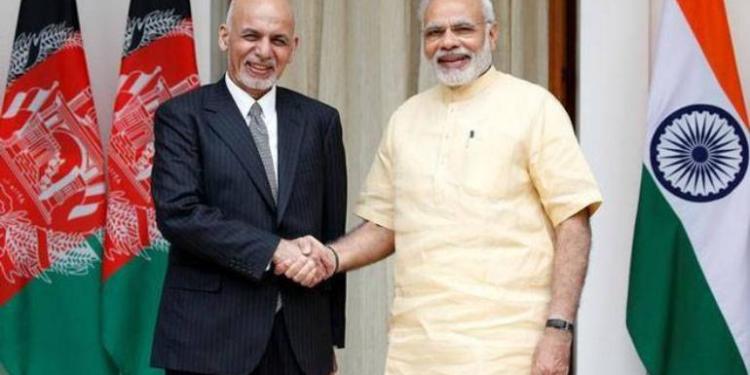President Trump, committed to the eventual withdrawal of US troops in Aghanistan, has expressed his displeasure over having only US troops present in the war-torn country. In a televised address, Trump said, “Why is not Russia there? Why isn’t India there? Why isn’t Pakistan there? Why are we (US) there? We are 6,000 miles away. But I don’t mind. We want to help our people. We want to help other nations.” The Trump administration has been pushing India to join in on the battle with Taliban in Afghanistan, although India has long maintained that no boots shall be sent to Afghanistan.
Mocking India’s development and reconstruction efforts in Afghanistan, Trump remarked, “I could give you an example where I get along very well with India and Prime Minister Modi. But he is constantly telling me, he built a library in Afghanistan. Library! That’s like five hours of what we spend (in Afghanistan)”. He went on to say, “And he (Modi) tells me. He is very smart. We are supposed to say, oh thank you for the library. Don’t know who’s using it in Afghanistan. But it’s one of those things I don’t like being taken advantage of.”
India has retorted to these statements, “India firmly believes in the critical role that developmental assistance can play in transforming human lives. India does not send its armed forces abroad except under the specific mandate of the UN Peacekeeping Operations,” and also mentioned India’s development aid to Afghanistan which exceeds $3 Billion, making India the biggest South Asian donor to Afghanistan. Moreover, the mention of a library has baffled Indian officials and some believe that Trump may have confused Afghanistan’s Parliament building built by India, for a library.
Ever since the US-led NATO troops took on the extremist Taliban regime and toppled it after the attacks in USA on September 11, 2001, India has been involved in rebuilding and reconstruction efforts in Afghanistan, as well as in maintaining peace and security. India’s aid to the war-ravaged nation has figured in terms of infrastructure projects, humanitarian assistance, economic development, capacity building and empowering Afghanistan’s security personnel, and enhancing connectivity.
One of India’s most important contributions to Afghanistan has been the reconstruction of the Afghan Parliament in Kabul costing over $90 Million and under the oversight of the Public Works Department (PWD). A part of the Parliament complex is called the Atal Block, named after the late Prime Minister Atal Bihari Vajpayee, who had broached for the idea. The building was completed in 2015, when Prime Minister Narendra Modi inaugurated it on December 5, 2015. India also gifted four Mi25 attack choppers to help the government counter Taliban in the country.
In 2016, Prime Minister of India inaugurated the Afghan-India Friendship Dam or the Salma Dam in Herat province of Western Afghanistan. The hydroelectric and irrigation dam project shall provide 42 MW of power and irrigate up to 75000 hectares. The $290 Million AIFD project is located on the Hari River which flows into Iran. India had objected to this development and had attempted to halt or sabotage the project for years. However, asserting the need for trilateral cooperation in the region through the Chabahar Port, India convinced Iran to give up its demur. In 2018, despite security threats, India also pledged to build a dam on the Kabul river in Afghanistan, which has irked Pakistan. The Shahtoot dam is estimated to cost about $305 Million. Pakistan has been seeking a water-sharing treaty with Afghanistan and the Shahtoot Dam shall serve as leverage to Afghanistan in bringing Pakistan to the negotiating table, who otherwise has been involved militarily by aiding Taliban fighters and providing safe havens for terror sanctuaries on its territory.
India has spent over a $100 Million in the expansion of the Chabahar Port in Iran and has built the 218 kilometre Zaranj – Delaram Road in Afghanistan which shall connect Chabahar with Afghanistan’s Ring Road. Hence, it shall serve as a crucial means of transport of goods and services in and out of Afghanistan, weakening Taliban’s grip on the nation, and assisting US troops who are blocked out by Pakistan ever since the aid cut by USA, tightening their supplies. Pakistan has long denied access to India through its land even to transport humanitarian aid to Afghanistan. Yet, India remains the second largest destination for Afghan exports. The Chabahar Agreement between the tripartite, Afghanistan, India and Iran shall boost trade and economic development of Afghanistan and the Salma and the Shahtoot Dams shall ensure the same for the Afghan people.
In the education sector, India has developed various schools and libraries under Community Development Initiatives. It has also reconstructed an elite high school in Kabul, and provides scholarships to study in India to about 1000 afghan students ever year. A cricket stadium in Kandahar costing about $1 Million had also been inaugurated in 2018. Afghan government has also received aid in terms of wheat from India. Besides this, it has helped build roads, power transmission lines to empower people and uplift them from the clutches of the extremists influence by facilitating livelihood opportunities. India also helps train diplomats and security personnel with capacity building in focus. It has pledged to train security personnel in the country to empower and harden them so that they shall forever be prepared to protect their interests and are not left stranded and paralysed with the probable withdrawal of foreign troops in the future.
Indian government has earned immense goodwill in Afghanistan with its humanitarian and development efforts serving as a healing touch to the war-torn nation. India’s constructive role in Afghanistan has averted a more severe humanitarian crisis than is at present owing to the perpetual war, the Taliban threatening nearly 70 per cent of the nation and the government struggling to gain control over half its territory. India’s efforts in the country should infact be applauded rather than mocked by the President of the United States, which is the largest foreign stakeholder in Afghanistan.



























